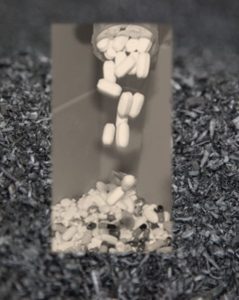This week I attended an eye-opening local meeting related to reigning in substance abuse within my County. I learned a ton, not least of which was that the people that work in this field deserve the utmost resect. More and more drop boxes are popping up but apparently liquids cannot be disposed of in drop boxes. Liquids can be dropped off at drug collection events but those occur only a few times per year. All collected drugs are weighed and then shipped over to be combusted at an incineration plant an hour away. Not the most environmentally friendly disposal method.
But what got my biochar juices flowing at this meeting was a new disposal options for liquid pharmaceuticals. The meeting organizer passed around a product that allows you to pour liquids into a bag filled with some unnamed material capable of neutralizing drugs, enabling it to then be disposed of in the normal trash collection process. Pills can also be disposed of in this manner as long as water is added to dissolve the pills.
The name of the product is DeTerra which immediately got me wondering what was inside the bag. Turns out it is nothing more than activated carbon (patented of course), biochar’s costlier carbon cousin. [A 3-pack, each capable of neutralizing 90 pills or 12 oz of liquids, costs $21. The package sent around the meeting room could not have weighed ¼ lb, translating to more than $60 per pound. Yowza.]
Although far more drugs find their way into waste or ground water via human or animal excretion, disposal of unused drugs is still a huge issue. The days of naïvely recommending that unused or expired drugs be flushed down the toilet to keep them out of harm’s way are long gone. Unfortunately many people still haven’t gotten that memo, so it still happens. A lot. The environment suffers, aquatic life suffers, and we thoughtless humans that are creating the problem, suffer the consequences.
In the developing world this problem is likely even more of a concern as many areas don’t have waste water treatment systems. Biochar could offer a low cost, locally made and safer alternative for liquid or pill disposal. Once the drugs are immobilized in the biochar they would still need to be disposed of safely. Enclosing the drug laden char in some type of container (e.g. zip lock bags, metal barrels, etc.) would be the best option and keeping it out of soils used for growing food would still be an imperative. I have yet to see this discussed in any peer reviewed papers or tested in practice, but my gut tells me this would be a far safer alternative than some of the more common disposal practices.


